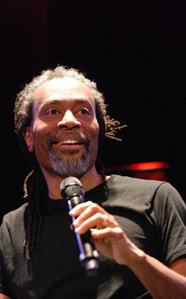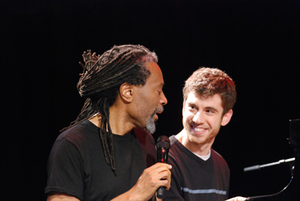Bobby McFerrin: One-Man Band

Bobby McFerrin
Photo by Phil Farnsworth

Bobby McFerrin works with a student.
Photo by phil farnsworth
Bobby McFerrin's opening piece was beautiful and intricate, incorporating Spanish lyrics, African-influenced rhythms, and jazz syncopations, all carefully interplaying with each other to create a sound worthy of a gifted orchestra—and all generated by nothing more his hand thumping on his chest, his foot tapping on the floor, and that four-octave vocal range hitting highs, lows, and everything in between. It sounded flawless, like the Grammy-winning solo vocalist had endlessly rehearsed it for this special occasion.
Then he casually revealed to the audience at the Berklee Performance Center that he had, in fact, made it up there on the spot.
"One of my concert rules is that the first piece I do has to be completely improvised," McFerrin told the crowd at the Soul of Singing concert/lecture, before adding slyly, "Then after that, I do whatever I want."
Berklee students and a few special invited guests, including Governor Deval Patrick and his family, had a chance to see and hear one of music's most unique talents up close when McFerrin appeared as part of the Warrick L. Carter Lecture Series, established in honor of the Berklee dean of faculty and later provost/vice president for academic affairs from 1984 to 1996.
Africana Studies professor William Banfield introduced McFerrin, whom he had met two decades ago at the University of Michigan. "Bobby has been a great colleague over the years," said Banfield, "and I'm happy to welcome him into the family atmosphere we have here at Berklee."
Dressed in a simple black T-shirt and jeans, McFerrin performed a series of songs utilizing his trademark brand of vocal gymnastics, which had the crowd of developing musicians gasping and shouting in amazement.
After impressing with his first piece, McFerrin confessed that his voice "takes me places sometimes accidentally," but at the same time, his total control of his voice was apparent as he went through more numbers—expertly mimicking a brass instrument here, a tribal drumbeat there.
And McFerrin does it all live on record the way he does it in concert. He answered one student's query about modern recording techniques with, "I've purposely avoided technology. I was always afraid if I hit a snag, I would just flip a switch and correct it. I wanted to solve the problem on my own."
He encouraged audience participation, bringing up Berklee students to join him —be it to play piano as McFerrin sang the standard "I've Got the World on a String" or to act as a human beatbox while McFerrin vocally improvised over the rhythm. He even managed to give a Berklee faculty member instruction on scatting technique before they dueted on Bobby Troup's immortal "Route 66."
McFerrin made it through nearly the entire performance before someone shouted out a request for "Don't Worry, Be Happy," the singer's mammoth hit from 1988. McFerrin was quick to shoot down any hopes that he would sing the infectious and, for better or worse, career-defining ditty, saying "I haven't sung it live since 1988, and the reason for that is that before any of you had ever heard [it], I'd already sung it 500 trillion times."
Freddy Gonzalez, a second-year Berklee student studying jazz composition and performance, said of the show, "It was amazing. I've never heard him sing before, and I was really amazed by his musicianship. It's great to see a performer who's not limited by the idea of genres or instruments-he can bring lots of different audiences together because he's so versatile. And it was clear that he feeds off audience participation."
Berklee alumnus William Junior said that he came back to campus specifically to see McFerrin, and was thrilled to have a chance to see a musician he idolizes in the flesh. "Seeing him in person goes so far beyond what you experience on record," said Junior. "I had a sense that he felt as though he was among family here, and that feeling transmitted to the audience."
Following an encore of "Drive" from his hit album Simple Pleasures—a number in which he pressed the microphone against his throat and subvocalised with amazing clarity, drawing whoops of disbelief from the audience—McFerrin's night with Berklee students was over. He left them, having no doubt achieved the goal he'd expressed to an earlier questioner: "I never really had a specific message to my music. If anything, I just hope people leave my performances a little more joyful."
